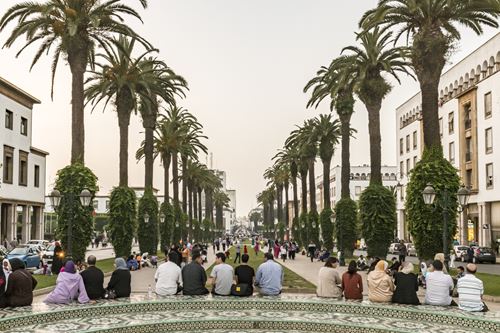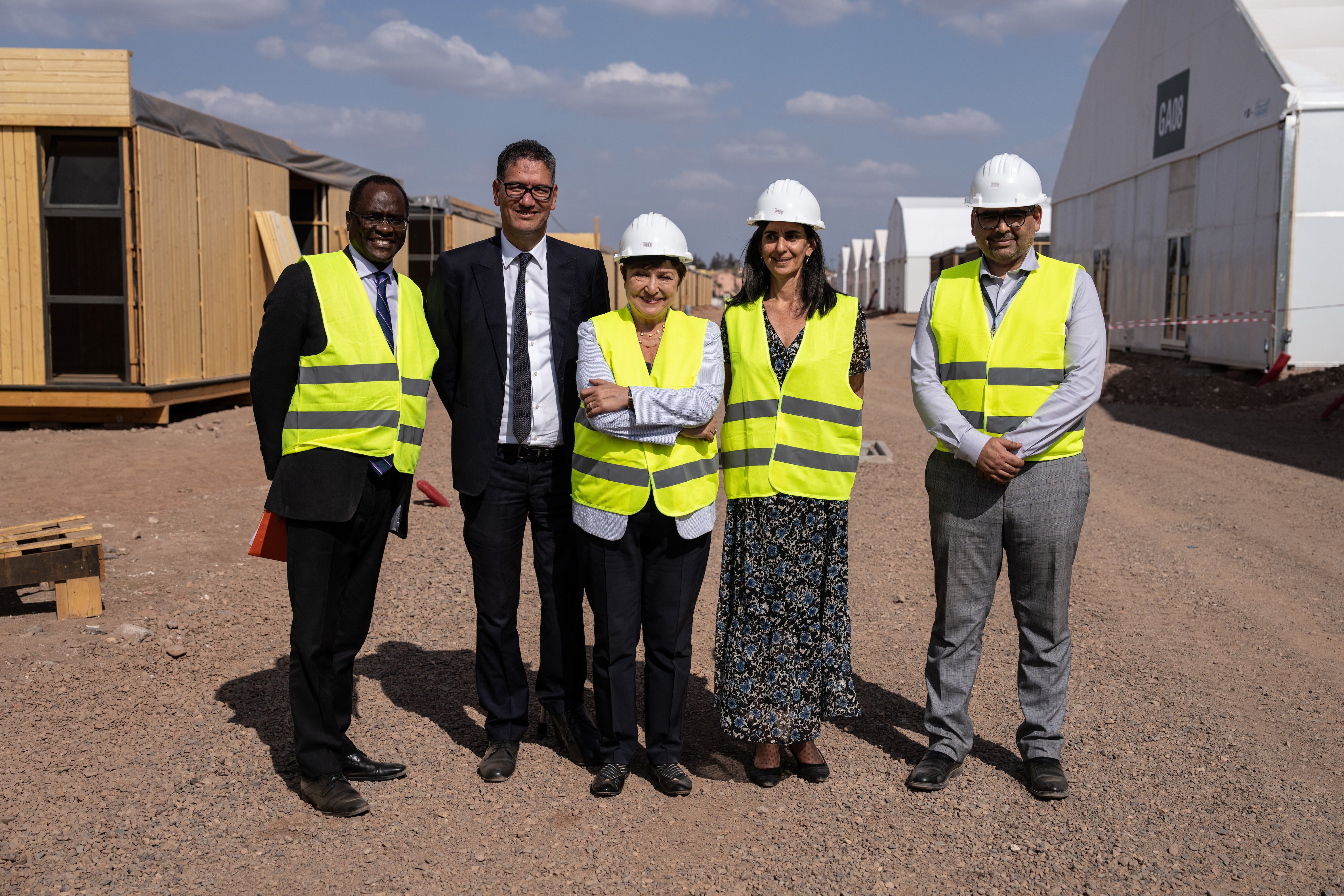
World Bank Group - IMF Annual Meetings, October 2023
Read our latest statements on the Meetings in Marrakesh: Statement by World Bank President Ajay Banga, IMF Managing Director Kristalina Georgieva, and Morocco’s Minister of Economy and Finance Nadia Fettah Alaoui on the 2023 World Bank-IMF Annual Meetings
Read our latest statements on the earthquake in Morocco: IMF Statement | Joint Statement
The Boards of Governors of the International Monetary Fund (IMF) and World Bank Group (WBG) normally meet once a year to discuss the work of their respective institutions. The Annual Meetings, which generally take place in September/October, have customarily been held in Washington for two consecutive years and in another member country in the third year. The Meetings bring together central bankers, ministers of finance and development, private sector executives, civil society, media and academics to discuss issues of global concern, including the world economic outlook, global financial stability, poverty eradication, inclusive economic growth and job creation, climate change, and others.
Visit the IMF's official Annual Meetings site and the Host Country site to learn more.

Amid a weakening global economy and elevated uncertainty, policymakers need to build a more resilient future by enhancing social safety nets to protect the most vulnerable, improving governance and accountability, strengthening policy frameworks, and tackling climate change. Food security concerns and the risk of future pandemics add to the urgency of increased effort and collaboration toward building resilient economies.

The impact of recent crisis upon crisis on the economic situation of countries has increased the need for structural reforms to bolster growth and secure a transformation that fosters inclusion and diversification, addresses the existential challenge of climate change, and supports digitalization.

The world is facing the risk of policy-driven geo-economic fragmentation, which could jeopardize the economic gains made over the past several generations. Mitigating this risk requires concerted efforts to advance areas of common interest, such as tackling climate change, food insecurity, and increasing pandemic preparedness. The IMF can play an important role in helping member countries adapt to emerging challenges and increasing collaboration. The 2023 Annual Meetings will provide an opportunity to reinvigorate global cooperation.

In preparation for the 2023 Annual Meetings, IMF Managing Director Kristalina Georgieva visited Morocco to meet with the authorities, media, civil society, and stakeholders — and to visit the site for the Meetings in Marrakech.
In the lead-up to Marrakech 2023, IMF Managing Director Kristalina Georgieva met with students from five universities in Morocco to answer their questions and thank them for volunteering their help with the Annual Meetings.
Central bank digital currencies (CBDCs) could help increase inclusion by giving more people access to financial services, strengthen the resilience and efficiency of payment systems, and reduce the number of intermediaries in cross-border payments, fostering competition and enhancing transparency. But unless carefully designed, central bank digital currencies could lead to financial stability risks, data privacy and legal challenges, financial integrity and cyber threats, and central bank operational risks. Given this context, what role should the public sector play? IMF Managing Director Kristalina Georgieva participated in a policy roundtable discussion with Bank Al-Maghrib to discuss.
The launch of an IMF paper that highlights the potential benefits of the African Continental Free Trade Area for the continent, and the policies and reforms needed to achieve them.
Economies in the Middle East and North Africa did better than expected in 2022 with growth of 5.3%, thanks to strong domestic demand and a rebound in oil production. But for 2023, we project growth to slow to 3.1%, reflecting the impact of tighter policies to safeguard macroeconomic stability, lower oil production, and weak external demand. Countries in the Caucasus and Central Asia benefited from higher oil prices, trade, and inflows of money and migrants from Russia in 2022, but we expect GDP to slow to 4.2% this year.
Persistent global inflation and tighter monetary policies have led to higher borrowing costs for sub-Saharan African countries and have placed greater pressure on exchange rates. Indeed, no country has been able to issue a Eurobond since spring 2022. The interest burden on public debt is rising, owing to a greater reliance on expensive market-based funding combined with a long-term decline in aid budgets. The lack of financing affects a region that is already struggling with elevated macroeconomic imbalances. Public debt and inflation are at levels not seen in decades, with double-digit inflation present in about half of the countries—eroding household purchasing power and striking at the most vulnerable.
The Middle East and North Africa, one of the most youthful regions in the world, has an opportunity to embrace the digitalization drive to address its long-term economic challenges of stubbornly high unemployment, low productivity, inequality, and a wide gender gap. In this panel discussion, young entrepreneurs from across the MENA region describe their journey from a simple idea to a successful business by leveraging digitalization, the difficulties faced by young entrepreneurs in the region, the needed ecosystem to support innovation, and the opportunities for structural reform that will maximize the benefits of digitalization.
Despite the pre-pandemic gains in poverty reduction, literacy and lifespans, many countries in the Middle East and North Africa (MENA) have struggled to ensure a more equal distribution of gains of economic benefits. Among the main issues that remain unresolved are the high share of inactive youth, large gaps in economic opportunities for women, and underdeveloped private sectors with tight regulation and limited access to credit that stifle the creation of new firms and growth in output, employment, and incomes. The objective of the book is to reassess the inclusive growth agenda in the MENA region in light of the rapidly changing, pandemic-influenced world. On March 15-17, the Middle East and Central Asia Department presented the book “Promoting Inclusive Growth in the Middle East and North Africa” to Pakistan’s leading academic institutions and think tanks. The analyses and policy recommendations in the book served as background for discussions on the priorities for economic and social reforms in Pakistan in the run up to the 2023 Marrakech Annual Meetings, to accompany the country in the quest for a more prosperous future for all its citizens. Similar events are being featured in other MENA countries to deepen the policy dialogue with member countries on strategies to foster inclusive growth in the region.
Get the latest updates from the International Monetary Fund about our work on the Middle East and North Africa. Each month, we provide a curated selection of IMF news and research on the region, including papers, blogs, events, videos, and more.